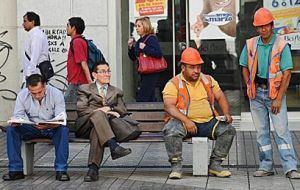MercoPress. South Atlantic News Agency
Brazilian economy creates the least payroll jobs in 2012 since 2003
 Unemployment still remains at an almost historic low of 4.9%
Unemployment still remains at an almost historic low of 4.9% The once-booming Brazilian economy created the fewest new jobs in a decade during 2012 as struggling manufacturing industries and mining companies hired fewer workers, according to Labour ministry data. Latinamerica’s leading economy added 1.3 million payroll jobs last year, the worst result since 2003 and way below the 2 million jobs created in 2011.
Facing lower commodity prices and heated competition from abroad, Brazilian mines, steel mills and makers of goods like shoes and beverages created fewer jobs last year. The service sector, which has been the bright spot of the tepid Brazilian economy, also added fewer jobs last year.
Even as the pace of formal job creation slowed, unemployment remains at a record low in Brazil, a disparity that some economists say is due to the way the data is collected.
The national statistics agency IBGE includes both formal and informal jobs in its calculation of the unemployment rate while the Labour ministry collects data from businesses that have workers legally registered. Informal jobs range from self-employed accountants to small business owners.
Record low unemployment remains a paradox in a country that has experienced two years of painfully slow economic growth. The Brazilian economy grew about 1% in 2012, a far cry from 7.5% in 2010.
Almost full employment and rising wages have helped President Dilma Rousseff remain immensely popular even as she struggles to reignite solid growth with a barrage of tax cuts and cheap credit.
The Labour ministry predicts that Brazil will create more than 2 million new jobs in 2013 as the economy picks up steam.
Economists say strict labour regulation makes it very difficult and costly to fire workers, forcing companies to keep employees on their payroll as they wait for the economy to improve.
Brazil's jobless rate fell more than expected to 4.9% last November and edged closer to an all-time low, an enviable position compared to developed nations hit by global slowdown. In Spain, unemployment hit an all-time high of a 26% in the fourth quarter, leaving 6 million people without a job at the end of last year.
Brazil could still face problems if the slow recovery does not speed up this year. The economy shed a more-then-expected 497,000 jobs in December, compared to 408,172 jobs lost in December of 2011. Companies tend to fire temporary workers in December after increasing production before the Christmas holidays.




Top Comments
Disclaimer & comment rules-

-

-

Read all commentsThe clever thing for the near future, when things do improve, is to get the EXISITNG workforce to produce more goods and wealth.
Jan 30th, 2013 - 12:22 pm 0This can be done by increasing production efficiency. Reducing manual input for some form of automation is definitely the way forward. It also improves the type of production worker and makes them more flexible.
But I suppose, looking at the unions, this is nothing short of heresy (if I believed in god, which I do not).
http://en.mercopress.com/2013/01/30/brazilian-economy-creates-the-least-payroll-jobs-in-2012-since-2003#comment210321: I think that the day when Europeans can lecture anybody about economics is long gone!
Jan 30th, 2013 - 04:23 pm 0@2 Hapatia
Jan 30th, 2013 - 06:11 pm 0Are you stupid by birth or do you work at it?
Would you like to demonstrate why I am incorrect with my post as you seem to 'think'.
I await with bated breath for your missive on this subject.
CLUE: it's not economics.
Commenting for this story is now closed.
If you have a Facebook account, become a fan and comment on our Facebook Page!